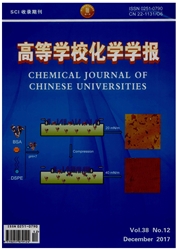

 中文摘要:
中文摘要:
通过静电作用和相分离技术制备海藻酸钠/壳聚糖静电复合弹性支架,研究了冷冻温度和固含量对支架材料孔径的影响及组分比对材料力学性能、亲水性、降解性能和生物相容性的影响.固含量为2%(质量分数)及冷冻温度为-24℃时,支架孔径为110~170μm,并且亲水性良好,平衡溶胀度大于1400%.改变固含量和组分比可调控材料的力学性能;循环力学测试表明,湿态支架具有良好的弹性和一定的耐疲劳性;降解速率可由组分比调控;兔脂肪干细胞(rASCs)在支架上的培养结果表明,羧基和氨基摩尔比为2∶1和1∶1时细胞以聚集体存在;羧基和氨基摩尔比为1∶2时细胞黏附于支架上,实现细胞黏附/聚集体的调控.
 英文摘要:
英文摘要:
Elastic scaffolds composed of sodium alginate( SA) and chitosan( CS) were fabricated via electrostatic interaction between —COOH,—NH2groups and phase separation technique. This study presented the influence of freezing temperature,solid content on pore size and molar ratio on mechanical strength,hydrophilicity,biodegradability and biocompatibility. The results showed that average pore size of alginate / chitosan scaffolds fabricated from 2%( mass fraction) solid content and at a freezing temperature of-24 ℃ was between110 and 170 μm. High swelling ratio of more than 1400% showed the excellent hydrophilic performance of these scaffolds. Degradation of the alginate / chitosan scaffolds could be modified by varying the molar ratio( —COOH / —NH2). The mechanical strength of the scaffolds could be controlled by different molar ratios and solid contents. The scaffolds exhibited good elastic behavior and fatigue durability by cyclic mechanical test in wet state. In vitro culture of rabbit adipose-derived stem cells( r ASCs) indicated that aggregated r ASCs were formed in the scaffolds when the molar ratios were 2 ∶ 1 and 1 ∶ 1,while adherent r ASCs were found in the scaffolds with molar ratio of 1 ∶ 2. Hence cellular adhesion behavior can be regulated by varying scaffold component.
 同期刊论文项目
同期刊论文项目
 同项目期刊论文
同项目期刊论文
 Poly(l-glutamic acid)/chitosan polyelectrolyte complex porous microspheres as cell microcarriers for
Poly(l-glutamic acid)/chitosan polyelectrolyte complex porous microspheres as cell microcarriers for Adipose tissue engineering with human adipose tissue-derived adult stem cells and a novel porous sca
Adipose tissue engineering with human adipose tissue-derived adult stem cells and a novel porous sca In-Situ Birth of MSCs Multicellular Spheroids in Poly(L-glutamic acid)/Chitosan Scaffold for Hyaline
In-Situ Birth of MSCs Multicellular Spheroids in Poly(L-glutamic acid)/Chitosan Scaffold for Hyaline Novel injectable porous poly(γ-benzyl-L-glutamate) microspheres for cartilage tissue engineering: Pr
Novel injectable porous poly(γ-benzyl-L-glutamate) microspheres for cartilage tissue engineering: Pr Novel injectable porous poly(γ-benzyl-L-glutamate) microcarriers for cartilage tissue engineering: P
Novel injectable porous poly(γ-benzyl-L-glutamate) microcarriers for cartilage tissue engineering: P Injectable in situ self-crosslinking hydrogels based on poly(L-glutamic acid) and alginate for carti
Injectable in situ self-crosslinking hydrogels based on poly(L-glutamic acid) and alginate for carti 期刊信息
期刊信息
